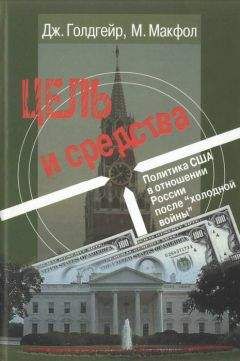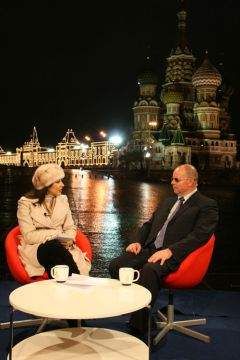Джеймс Голдгейер - Цель и средства. Политика США в отношении России после «холодной войны»

Помощь проекту
Цель и средства. Политика США в отношении России после «холодной войны» читать книгу онлайн
760
Belton С. Was the July'98 Aid Diverted? // Moscow Times. — July 27, 2000.
761
Reddaway P. Is Chernomyrdin a Crook? // Post-Soviet Prospects. — Vol. 3. — August 1995. — P. 1-4; and. Aslund A. Russia's Sleaze Sector' // New York Times. — July 11, 1995. — P. A17.
762
Risen J. Gore Rejected CIA Evidence of Russian Corruption // New York Times. — November 23, 1998. — P. A8. Talbott, The Russia Hand. — P. 448, note 11, on the lack of concrete evidence about the memo.
763
Speaker's Advisory Group on Russia, Christopher Cox, chairman, Russia's Road to Corruption: How the Clinton Administration Exported Government Instead of Free Enterprise and Failed the Russian People (House of Representa tives, September 2000 (policy.house.gov/Russia [July 7, 2003]). Chapter 6 of this study is called «Bull****: Gore and Other Administration Policy Makers Systematically Ignore Evidence of Corruption of Their 'Partners'».
764
Помимо очерка Ллойда, перечень статей с тем же названием включает: Broder J. Who Lost Russia? // Salon. — September 1, 1998 (salon.com); Who Lost Russia? // Socialism Today. — No. 32. — October 1998; a special symposium of several authors under the title. What Went Wrong In Russia // Journal of Democracy. — Vol. 10. — April 1999. — P. 3-86; Soros G. Who Lost Rus sia? // New York Review of Books. — April 13, 2000. — P. 10; Who lost Russia? // New York Post. — September 24, 2000. — P. 56; Cage M. Looking Behind Potemkin's Wall: How American Policy Has Failed Russia. — Washington: Nixon Center Working Paper, October 2000; a book review by R. Kap lan called Who Lost Russia? // New York Times. — October 8, 2000. — Sec. 7. — P. 29.
765
Who Lost Russia? // New York Post. — September 24, 2000.
766
Ignatius D. Who Robbed Russia? // Washington Post. — August 25, 1999. — P. A17.
767
Weinberger С Historical Solutions Would Have Worked Better, remarks in «Who Lost Russia?» // Heritage Lectures. — No. 629. — January 8, 1999.
768
Lapidus G. Transforming Russia: American Policy in the 1990s. — In: Lieber R. Eagle Adrift: American Foreign Policy at the End of the Century (Longman, 1997). — P. 130.
769
U.S. — Russian Relations at the Turn of the Century (Washington: Carnegie Endowment for International Peace, 2000). — P. 19-20.
770
Graham Т.Е. A World with Russia? paper presented at Jamestown Foundation Conference. — June 9, 1999. — P. 1.
771
См. также: Илларионов А. Как был организован российский финансовый кризис //Вопросы экономики. — № 11, ноябрь 1998. — С. 20-35; and Illarionov A. Russia and IMF, statements prepared for the General Oversight and Investigation Subcommittee of the U.S. House Committee on Financial Services, Hearing to Examine the Russian Economic Crisis and the International Monetary Fund (IMF) Aid Package. — September 10, 1998. — 105 Cong. 2 sess. Западные специалисты приводили подобные аргументы, см.: Slay B. Russia and the IMF: Economic Choises and Political Will // Russian Business Watch. — Vol. 7 (Summer 1999). — P. 1, 16-20; McFaul M. Getting Russia Right // Foreign Policy. — No 117 (Winter 1999-2000) (www.foreignpolicy.com).
772
Hedlund, Russia and the IMF. — P. 104-136.
773
Simes D.K. Russia's Crisis, America's Complicity // National Interest. — No. 54 (Winter 1998-1999). — P. 12-22; Reddaway P. and Glinski D. The Tragedy of Russia's Reforms: Market Bolshevism against Democracy. — Washington: U.S. Institute of Peace, 2001.
774
On the first school, see Stone, Lending Credibility. On the second school, see: Aslund, Building Capitalism. On the third school, см.: Илларионов А. Инфляция и антиинфляционная политика.
775
The FDI figures were reported in Kahn and O'Brien, Easy Money: A Special Report.
776
Lapidus. Transforming Russia: American Policy in 1990s. — P. 130.
777
Simes D. After the Collapse: Russia Seeks Its Place as a Great Power (Simon and Schuster, 1999); Cohen S. Failed Crusade: America and the Tragedy of Post-Communist Russia (W.W. Norton, 2000).
778
Simes. Russia's Crisis, America's Complicity. — P. 12-22.
779
Blank S. Partners in Discord Only // Orbis. — Vol. 44 (Fall 2000). — P. 557-570.
780
David Lipton testimony before the House Banking General Oversight Committee and Investigation Subcommittee on Russia, 105 Cong. 2 sess. — September 10, 1998.
781
Talbott S. Gogol's Troika: the Case for Strategic Patience in a Time of Troubles, address at Stanford University. — November 6, 1998.
782
David Lipton, testimony before the House Banking General Oversight Committee and Investigation Subcommittee on Russia.
783
U.S. Policy toward Russia: Foundations, Achievements, and Continuing Agenda, document sent to McFaul from David Levy, National Security Council, Office of Public Affairs and Communications, September 17, 1999. — P. 2.
784
Lawrence Summers, testimony before House International Relations Committee on Russia, 105 Cong. 2 sess. — September 17, 1998.
785
Interview with Atwood.
786
Madeleine Albright, address to the U.S. — Russian Business Council, Chicago Illinois, October 2, 1998 and Lippman, Turmoil, Drift in Russia Prompts U.S. Policy Shift, Flexibility, Recognition of Limits Mark New Approach. — P. A27.
787
Summers L. The Global Stake in Russian Economic Reform, speech to the U.S. — Russia Business Council, April 1, 1997.
788
Lippman. Turmoil, Drift in Russia Prompts U.S. Policy Shift, Flexibility, Recognition of Limits Mark New Approach. — P. A27.
789
Madeleine Albright, address to the U.S. — Russian Business Council.
790
Talbott, Gogol's Troika: the Case for Strategic Patience in a Time of Troubles.
791
Talbott, The Russia Hand. — P. 286.
792
Tarnoff С U.S. Bilateral Assistance to Russia, 1992-2001. — In: Russia's Uncertain Economic Future, compendium of papers submitted to the Joint Economic Committee, Congress of the United States (Government Printing Office, December 2001). — P. 381.
793
Interview with George Ingram.
794
U.S. Policy toward Russia Foundations, Achievements, and Continuing Agenda. — P. 2.
795
Madeleine Albright, address to the U.S. — Russia Business Council; and Albright address to Carnegie Endowment.
796
Strobe Talbott, deputy secretary of state, «Russia: Its Current Troubles and Its Ongoing Transformations», prepared testimony before the House International Committee, 106 Cong, 1 sess. — October 19, 1999. — P. 5.
797
Fisher S. What Went Wrong in Russia // Financial Times. — September 27, 1999. — P. 26.
798
Albright, address to the U.S. — Russia Business Council.
799
Talbott, The Russia Hand. — P. 287.
800
Excerpts from Clinton's Remarks: «You Have to Play by the Rules // New York Times. — September 2, 1998. — P. A10.
801
Talbott. The Russia Hand. — P. 286.
802
Albright, address to the U.S. — Russia Business Council; and interview with Lipton.
803
См.: Примаков Е. Восемь месяцев плюс, С. 129-144.
804
Interview with Talbott.
805
Talbott, The Russia Hand. — P. 296.
806
IMF Says Russia Managing Well without IMF Loans // Reuters. — September 8, 2000.
807
Aslund A. Go Long on Russia // International Economy. — July-August 2002. — P. 38-39. Серьезную критическую оценку долгосрочных уроков, извлеченных из событий августа 1998 года, см.: Gaddy С. and Ickes В., Russia's Virtual Economy (Brookings, 2002). — Chap. 9.
808
См. обобщенное изложение Путиным этих достижений в выступлении на встрече Всемирного экономического форума в России 30 октября 2001 г.
809
Aslund A. and Boone P. Russia's Surprise Economic Success // Financial Times. — October 9, 2001. — P. 13. On specific sectors, see: Further Expansion of Manufacturing Economy Recorded as Demand Rises Sharply // Moscow Narodny Purchasing Manager's Index. — May 1, 2001. — P. 1.
810
Brunswick UBS Warburg, Russia Equity Guide 2000/2001. — P. 21.
811
См., например, совпадающие оценки различных аналитиков в: Sapir J. The Russian Economy from Rebound to Rebuilding // Post-Soviet Affairs. — Vol. 17. — January-March 2002. — P. 1-22; Millar J. The Russian Economy: Putin's Pause // Current History. — October 2001. — P. 336-42; and Gaddy and Ickes. Russia's Virtual Economy' and Aslund, Building Capitalism.
812
Remarks by Stephen Sestanovich, Carnegie Endowment for International Peace. — February 21, 2001.
813
RFE/RL, Newsline. — Vol. 5. — No. 229. — Part 1. — December 5, 2001.
814
Halberstam D. War in a Time of Peace: Bush, Clinton and the Generals (Scribner, 2001).
815
Интервью со Строубом Тэлботтом.
816
McFaul M. Russia's Many Foreign Policies // Демократизация. — Т. 7 (лето 1999 г.). — С. 393-412.
817
Mandelbaum M. A Perfect Failure // Foreign Affairs. — Vol. 78. — Septembe-October 1999. — P. 2-8; а также Nye J. Redefining the National Interest // Foreign Affairs. — Vol. 78. — July-August 1999. — P. 22-35.
818
Yeltzin B. Midnight Diaries, trans, by Catherine Fitzpatrick // Public Affairs, 2000. — C. 255.
819
Yeltsin, Midnight Diaries. — P. 225.
820
Дополнительно о причинах войны см.: Daalder I. H. and O'Hanlon M.E. Winning Ugly: NATO's War to Save Kosovo (Brookings, 2000).
821
Talbott S. The Russia Hand: A Memoir of Presidential Diplomacy. — P. 300.
822
См.: Daalder I.H. and O'Hanlon M.E. Winning Ugly. — P. 45-49.
823
Ibid.; and Halberstam, War in a Time of Peace.
824

























